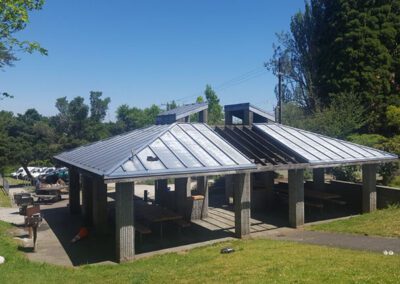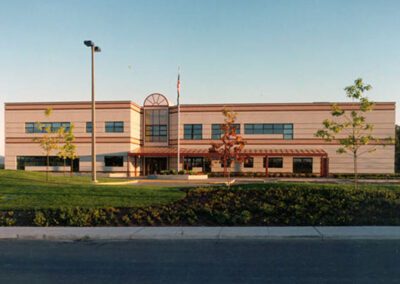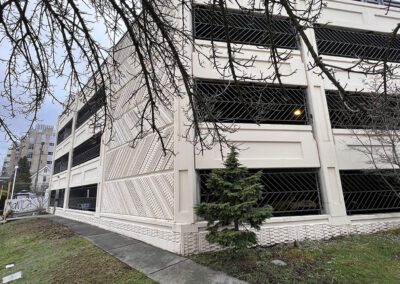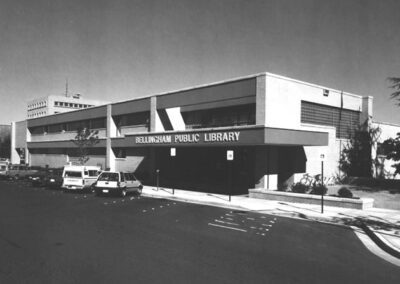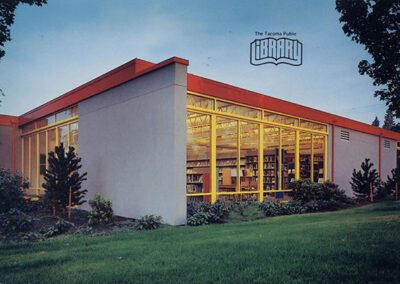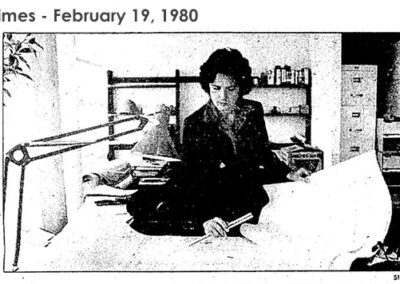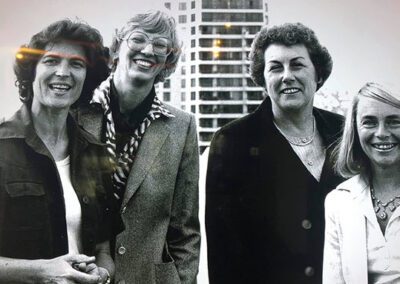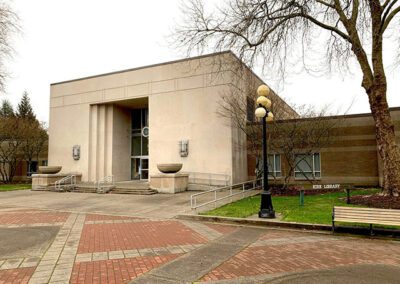
LaTourelle, Elaine Day
(1938 – )
Architect and women’s rights activist Elaine Day LaTourelle made a profound and distinct impact on the built environment in the Pacific Northwest. Born on September 9, 1938 in Bexar, Texas, Evelyn Elaine Day moved to Seattle with her parents Emmett E. and Roxie E. Day in 1948. Her dad became a distinguished professor of mechanical engineering at the University of Washington, and her mom, was a home economics teacher for the Seattle School District. A graduate of Roosevelt High School, Elaine received her Bachelor’s degree in Architecture from the University of Washington in 1961, and then a Master’s degree from Yale University in 1964.
Upon graduation she took a job at the D.C. office of the South Carolina architectural firm of Lyles, Bissett, Carlisle & Wolfe. During that time, she married her high school sweetheart John Allen LaTourelle, on May 3, 1965 at the age of 26.
John, also a University of Washington graduate, was a land use planner by training and the two decided to open their own architecture and planning firm in Seattle in 1969. Known as The LaTourelle Associates (1969-1980) the firm took on a variety of projects. Many were for tribal communities across Puget Sound and included working with the Tulalip, Skokomish, Swinomish and Suquamish Tribes. Despite their divorce in 1975, Elaine and John continued working together for many years.
Elaine opened her own firm, Elaine Day LaTourelle & Associates in 1976 and began a specialization in library planning and construction. Over the course of her career, the firm was responsible for programming, design and construction of over 50 libraries scattered across the Pacific Northwest. Projects included the North Mason Library in Belfair (1979); an addition to the Bellingham Public Library (1985); the Dr. Martin Luther King Jr. Library (1988) in Tacoma; the Mill Creek Library (1988); the Vashon Island Library; an addition to the Swasey Public Library (1989) in Tacoma; and a library for Renton Technical College Library. Her extensive experience with library work led her to become a consultant to the State Higher Education Coordinating Board in 1992.
Beginning in the early 1990s, LaTourelle also served as a key consultant to the Seattle Public Library System for several years. She helped them chart a long-term development plan for the Downtown Central Library and all 22 branches and wrote the Library System’s long-range Facilities Master Plan (1994). Within that document she proposed solutions for deficiencies and cost estimates. Additionally, she prepared all Seattle Public Library Branch Plans for bond campaigns, directing the site search and evaluation for the proposed new Central Library (designed by Rem Koolhaas, 2004).
A notable project was her work for Centralia Community College. There, her team designed the Learning Assistance Resource Center (1991) which was comprised of several buildings. LaTourelle also took an active role in getting Michael Spafford’s controversial “Twelve Labors of Hercules” murals installed in the Corbet Theater building (2003) and artist Alden Mason’s murals installed in the Henry Kirk Library. Originally commissioned for the Legislative Building in Olympia, the murals caused controversy and were eventually removed and put in storage before the community college acquired the art on long-term loan.
Other design work included the Harborview Hospital Boren St. Parking Garage with artist Vicki Scuri (1990); the Sherwood Forest Specialty Park in Bellevue (1987); the Dr. Jose P. Rizal Park (1981) in Seattle; and the Whatcom Community College – Laidlaw Center (1987) in Bellingham.
LaTourelle often took on projects with a collaborative approach, understanding the power of bringing the right experts and knowledge to the table. A frequent collaborator was Robert M. Barger whom she shared office space with in the late 1970s. Other collaborations include Westlake Park in Seattle with the landscape firm of Hanna/Olin Ltd. from Philadelphia.
In the Spring of 1980, in order to submit a proposal for the King County jail project, LaTourelle formed a limited partnership with fellow female architects Carolyn Geise, Lottie Eskilsson, and Jane Hastings. While their collaboration, which they called ARCHITECTA, failed to make the short list, the group continued working together, offering consultative services for several years.
On the side, LaTourelle served on the faculty of the University of Washington (1975-1990). While there she taught both graduate and undergraduate design studios, and served as both an undergraduate coordinator and a graduate program advisor. She also helped develop a study program with the University of Liverpool and taught in the Architecture in Rome Program. Professor LaTourelle’s design studios and thesis topics often emphasized public buildings, social issues and conditions, as well as special populations, working with community groups on real projects.
Over the course of her career, she was an active leader on a variety of women’s rights issues. Beginning in the 1960s she helped organize and lead numerous efforts on a variety of issues at the city, county and state level. These included divorce reform, child care, justice for women offenders, sexism and racism in school textbooks, violence against women, the scarcity of women political candidates, and fair housing and employment. LaTourelle was also actively involved in the National Organization for Women (NOW). She helped organize the Seattle chapter in 1970, and served in several leadership capacities, including a term as chapter President in 1972, and two years as National Legislative Vice President.
Today LaTourelle still resides in Seattle. Her personal and company archives can be found at the University of Washington Special Collections.
– Michael C Houser
Whatcom Community College – Laidlaw Center | Bellingham
Built 1987 | Source: Whatcom Community College
ARCHITECTA | Seattle
L to R – Elaine Day LaTourelle, Carolyn Geise, Jane Hastings and Lottie Eskilsson
